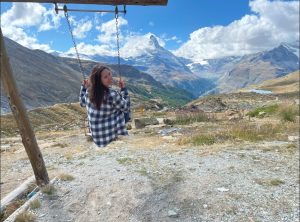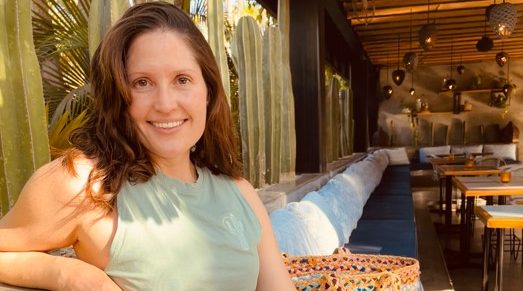Danielle Dysinger is a forward thinking entrepreneur, engineer, and outdoor enthusiast based in Tucson, Arizona. With a degree in chemical engineering from the University of Arizona, Danielle’s career began in high level project management roles at Intel, Roche, and Exyte, where she mastered problem solving on a large scale. However, her passion for adventure, sustainability, and practical design led her to take a different path—one that combined her technical expertise with her love for the outdoors.
She founded Big Sky Campers, a company dedicated to providing high quality, minimalist, and affordable camper setups for modern adventurers. Inspired by the IKEA model of flat-pack design, Danielle reimagined camper construction, creating modular, easy-to-assemble systems that allow people to explore without breaking the bank. Her campers offer a cost-effective alternative to van life, reducing depreciation and making adventure accessible to more people.
Beyond her business, Danielle is an advocate for sustainable travel, a cycling enthusiast, and a believer in the power of self sufficiency. She enjoys spending her free time exploring Arizona’s scenic landscapes, experimenting with new recipes, and continually refining her innovative approach to outdoor gear.
Q/A with Danielle Dysinger: The Future of Affordable Adventure
What was the moment that made you realize you wanted to leave corporate engineering and start Big Sky Campers?
It wasn’t a single moment—it was a buildup of moments. I spent years managing large-scale engineering projects, and while I loved problem-solving, I felt like I was solving problems that didn’t have a direct impact on people’s daily lives. Meanwhile, my passion for the outdoors was growing.
One weekend, I was out camping and saw a couple struggling to set up their overloaded, expensive camper van. It was clunky, overly complicated, and cost more than most people’s yearly salary. At the same time, I met someone who had rigged up the simplest, most efficient sleeping setup in the back of their car. That contrast stuck with me.
I started thinking: Why isn’t there a middle ground? Why do people have to choose between a $100,000 van or sleeping in a cramped backseat with no organization? With my engineering background, I knew I could design something smarter—something modular, easy to ship, easy to build, and accessible to a wider audience. That’s when Big Sky Campers was born.
From Engineer to Entrepreneur: My Journey to Big Sky Campers
You’ve compared your campers to IKEA furniture. Why take the flat-pack approach?
Flat-pack design solves a lot of problems. Traditional campers and custom van builds are expensive, difficult to ship, and often require professional installation. That adds unnecessary barriers for people who just want to get out and explore.
By designing campers that ship flat and can be assembled at home, I cut down on costs significantly—no need for custom labor, expensive delivery, or specialized tools. It’s a practical, DIY-friendly solution that gives adventurers more control over their setup.
Plus, flat-pack doesn’t mean cheap—it means efficient. Every piece is engineered to maximize durability, functionality, and space efficiency. And because it’s modular, it can adapt as your needs change.
Why do you think people are moving toward minimalist camping solutions?
I think people are realizing that more stuff doesn’t equal more adventure. The van life movement is great in theory, but the reality is that most people don’t want to sink their life savings into a depreciating vehicle.
Minimalist camping isn’t about sacrificing comfort—it’s about prioritizing what actually matters. When your setup is simple, lightweight, and functional, you’re free to focus on the experience instead of managing a complicated rig.
I’ve also noticed a shift toward financial mindfulness. People are asking themselves, Do I really need a $100,000 van to enjoy the outdoors? The answer is no. A well-designed, affordable, modular camper setup gives you the freedom to travel without the debt or long-term commitment of a fully converted van.
What’s been the biggest challenge in building a business based on a new way of thinking?
Changing people’s perceptions. A lot of folks assume that if something costs less, it must be lower quality. But cost isn’t always a reflection of quality—it’s often a reflection of unnecessary complexity.
I’ve spent a lot of time educating people on why modular, DIY, and flat-pack designs make sense. Once they see the thought and engineering behind it, they get it. But getting people to move past their initial skepticism has been a challenge.
Another challenge has been the logistics of keeping costs low while maintaining high standards. I refuse to cut corners on materials, so I’ve had to be strategic about sourcing and manufacturing. But I’d rather grow slowly and do it right than compromise on quality.

What do you wish more people understood about starting their own business?
That you don’t need to have all the answers before you start. I think a lot of people get stuck in the planning phase, waiting until they feel 100% ready. The truth is, you’ll never be fully ready. You just have to start.
When I launched Big Sky Campers, I had a vision, a prototype, and a whole lot of trial and error ahead of me. I didn’t have a perfect business plan, but I had a clear mission: make adventure more accessible. Everything else, I figured out along the way.
Also, flexibility is key. Your business will evolve in ways you didn’t expect. If you’re too rigid, you’ll miss opportunities to grow in the right direction.
What advice do you have for someone who wants to start camping but doesn’t know where to begin?
Start small. You don’t need to plan a cross-country trip or invest in expensive gear right away. Grab a simple setup, find a local spot, and just go.
Too many people overcomplicate things. They think they need the perfect gear, the perfect destination, or tons of experience. The best way to learn is by doing. Get out there, see what works for you, and adjust as you go.
Also, know your priorities. Do you care most about cooking space? Sleeping comfort? Storage? Once you figure out what matters most to you, choosing the right setup becomes much easier.
What’s next for Big Sky Campers?
I’m working on expanding the product line to give people even more customization options. I want people to be able to build a setup that’s exactly right for their needs, whether that means more storage, an upgraded kitchen module, or an ultra-lightweight version for compact cars.
I’m also looking into partnerships that would make assembly even easier for those who prefer a ready-to-go option. While DIY is a big part of the appeal, I know that some people would love a professional assembly option, and I want to provide that choice.
Most importantly, I want to keep pushing the idea that adventure should be accessible. If I can help more people get outside without financial stress, that’s a success in my book.
Final Thoughts
Danielle Dysinger’s journey from corporate engineer to outdoor entrepreneur is proof that innovation isn’t just about technology—it’s about rethinking what’s possible. Through Big Sky Campers, she’s breaking down the financial and logistical barriers to adventure, proving that you don’t need a massive budget to explore the world.
Her message is clear: less complexity, more freedom. By embracing modular, minimalist, and affordable solutions, she’s empowering more people to hit the road, discover new places, and experience the joy of simple, self-sufficient travel.
Whether you’re a seasoned camper or just starting your journey, Danielle’s approach reminds us that adventure isn’t about how much you spend—it’s about how you experience the world.

